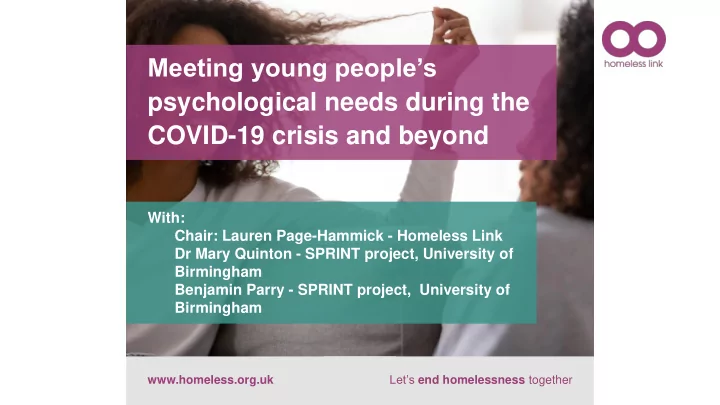

Meeting young people’s psychological needs during the COVID-19 crisis and beyond With: Chair: Lauren Page-Hammick - Homeless Link Dr Mary Quinton - SPRINT project, University of Birmingham Benjamin Parry - SPRINT project, University of Birmingham Let’s end homelessness together www.homeless.org.uk
Dr Mary Quinton and Benjamin Parry MEETING YOUNG PEOPLE’S PSYCHOLOGICAL SPRINT project NEEDS THROUGH COVID-19 AND BEYOND University of Birmingham www.sprintproject.org @Mary_q6 @BenJohnParry #MSTtoolkit
WHY NOW?
WHY NOW? Young people who do not feel they have access to the resources they need in the pandemic are also 19% more likely to be feeling family strain 83% of young people have stated the pandemic has worsened their mental health, reporting increased anxiety, problems with sleep, panic attacks, or more frequent urges to self-harm among those who already self-harmed
SOUND FAMILIAR? Isolation and loneliness Lockdown and Anxiety Depression social Losing jobs Family Added distancing tensions pressure on Non-compliance housing COVID-19 with social services distancing Young people Lack of support Dropping out feel controlled available of education and isolated Vulnerability to exploitation and abuse Psychological needs being thwarted
MST4Life BACKGROUND Mental Skills Training Toolkit Basic Psychological Needs
MY STRENGTHS TRAINING 4 LIFE (MST4LIFE) Mental Skills Training Sport Psychology Researchers from UoB Mental Skills Training with AVFC youth academy Mental skills are cognitive processes that help us manage our thoughts, feelings and behaviours
MY STRENGTHS TRAINING 4 LIFE (MST4LIFE) Mental Skills Training Sport Psychology Researchers from UoB Mental Skills Training with AVFC youth academy Key reasons for mental skills training is handling pressure
Pressure
‘Mental Skills Toolbox’ Self- reflection Goal-setting Regulating thoughts Identity Motivation Action Pressure planning Resilience Self-confidence Problem- solving Self-worth Managing emotions Reframing
MY STRENGTHS TRAINING 4 LIFE (MST4LIFE) Mental Skills Training Sport Psychology Researchers from UoB Young people experiencing homelessness Mental Skills Training with AVFC youth academy
MY STRENGTHS TRAINING 4 LIFE (MST4LIFE) Sport Psychology Young people Researchers from experiencing UoB homelessness Theory-informed PIE informed Collaborative, Community-based Research ‘Outsiders’ Key stakeholders Project Non-stigmatising Complex needs Different skill-set Gatekeepers Evaluation Social outcomes
Stakeholder consultations Transfer of skills in a Promoting the challenging and safe programme environment Pre-Intervention: Preparation Outdoors environment promotes well-being Phase 1: Phase 2: 10 workshops Residential OAE course Promoting well-being, self- awareness, life skills, and resilience Post-Intervention: Check-in with Follow-up Hands-on learning young people (in-house and out-of- house) Collect follow- up data
VIDEO
OUTCOMES Over 600 young people reached Resilience Capacity to self-regulate, improved awareness of strengths, Self-worth and ‘life changing’ experiences Well-being Course satisfaction
MENTAL SKILLS TRAINING TOOLKITS
MENTAL SKILLS TRAINING TOOLKITS Having emotionally safe conversations Supporting young people’s basic psychological needs
MENTAL SKILLS TRAINING TOOLKITS Increased feelings of vulnerability Having emotionally safe Now more than ever, conversations conversations are so valuable Supporting young people’s basic psychological needs Understanding how we construct these conversations
SELF-DETERMINATION THEORY How we build and sustain motivation to foster long-term life satisfaction and well-being
Basic Psychological needs Competence • The need to feel capable Autonomy • The need to feel we have choice Relatedness • The need to feel connected
Physical cal How can we support young people’s basic psychological needs during COVID19?
Needs thwarting Needs supportive Our behaviour diminishes one’ s Our behaviour helps others feel like feelings of that basic psychological their basic psychological needs are needs are being met being met Relatedness • The need to feel connected
Needs thwarting Needs supportive Our behaviour diminishes one’ s Our behaviour helps others feel like feelings of that basic psychological their basic psychological needs are needs are being met being met It’s okay to Yeah sure, back feel stressed to this form sometimes I understand why you Sorry I’ve got the TV on might be feeling that way in background
Examples in conversation Warm, friendly Task-orientated, approach closing down conversation, not Hey Cameron, great to hear from you, active listening how are you? How’re you holding up in lockdown? Not being Showing a present, not genuine interest validating Yeah I’m alright Are you sure? You seem a little quiet, is Acceptance, validation, being there anything you want to talk about? Good, well we’ve got a lot to get flexible based on on with so let’s get started needs I’m just having a low day, I want to go see my mates but I can’t Ok So, we’re doing goal setting. Step 1, tell me something achieved Sorry to hear that, I can understand why that must feel frustrating. What Yeah I’m not sure I feel would you like to do today? There’s no up to this today I’ve got a lot of people pressure to do the dream team tool The dream team might to speak today, so when today if you’d rather just have a chat help actually shall we do it?
TAKE AWAY MESSAGES Be understanding Be present Be patient Conversations Matter What we say and how we say it Be mindful of needs How can we support supportive or needs young people’s basic thwarting behaviours psychological needs Social distancing doesn’t during COVID19? mean being socially distant
BEYOND COVID-19
WHAT DOES THIS LOOK LIKE MOVING FORWARD? Be realistic Listen and validate Meet young people where they are at
RESOURCES Center for Self-Determination Theory What Works Wellbeing Mind selfdeterminationtheory.org Young Minds Futurelearn.com – psychological first aid whatworkswellbeing.org
THANK YOU Get in touch m.quinton@bham.ac.uk b.parry@bham.ac.uk @Mary_q6 @BenJohnParry #MSTtoolkit www.sprintproject.org
Questions and discussion With: Chair: Lauren Page-Hammick - Homeless Link Dr Mary Quinton - SPRINT project, University of Birmingham Benjamin Parry - SPRINT project, University of Birmingham Let’s end homelessness together www.homeless.org.uk
Recommend
More recommend